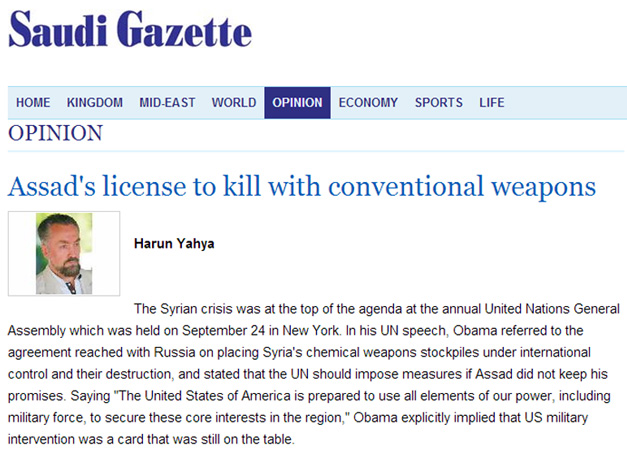
http://www.saudigazette.com.sa/index.cfm?method=home.regcon&contentid=20130928181815
The Syrian crisis was at the top of the agenda at the annual United Nations General Assembly which was held on September 24 in New York. In his UN speech, Obama referred to the agreement reached with Russia on placing Syria's chemical weapons stockpiles under international control and their destruction, and stated that the UN should impose measures if Assad did not keep his promises. Saying "The United States of America is prepared to use all elements of our power, including military force, to secure these core interests in the region," Obama explicitly implied that US military intervention was a card that was still on the table.
As you know, the Russian proposal that “the Assad regime should place its chemical arsenal under international control” while a possible US strike against Syria was in the works has been accepted by the Damascus regime, Russia and the US. The plan foresees that “all Syria’s chemical weapons and equipment will be handed over for destruction by mid-2014.” However, this is clearly no solution.
On the other hand, those who regard the Damascus regime as having won a major political victory by agreeing to this new proposal are mistaken. With this initiative, Moscow has made a gambit aimed at protecting its own interests in Syria. For Russia, Assad, who is politically bankrupt and had lost control of his chemical/conventional weapons, is now a political partner with no future.
In his latest statement on Syria, issued at the Kremlin on September 19, Russian President Putin once again repeated that he did not trust the Assad regime, saying, “We cannot be 100 percent sure that the Damascus regime will fully comply with the agreement on chemical weapons reached with the US, but we hope that it will.”
In a speech made in Tehran, Rohani, the new president of Iran, which has stood by Damascus right from the outset, said that he favored Assad’s departure, saying, "Whoever Syrian citizens vote for to rule their country, we'll agree with it."
The Assad regime, which is surviving largely thanks to support from Moscow, Beijing and Tehran, has clearly used up all its lines of credit.
Assad is known to have around 1,000 tons of chemical weapons in 45 different facilities, and most of these were relocated when the question of an intervention arose. Only 19 chemical weapons stores are in their former locations. There is, therefore, no way of trusting the Damascus regime to hand over all its chemical weapons stockpile.
Furthermore, according to Sevil Atasoy, a Turkish forensic medicine specialist and criminologist, even if Syria gave up its entire chemical weapons to foreign control, Damascus could easily manufacture such weapons again.
The Pentagon believes at least 75,000 troops would have to be sent to Syria in order to protect the inspectors. This and the difficult conditions within Syria mean that Assad has more time to commit new atrocities.
The option of an intervention in Syria has been shelved and the Assad regime has been licensed to continue with its atrocities so long as it does not use chemical weapons. The international community has chosen to turn a blind eye and a deaf ear to the atrocities in Syria under a supposedly diplomatic guise.
The future can be gleaned from what the Assad regime has done over the last three years: 90,000 of the more than 100,000 who have died in Syria to date are civilians.
The number of those who have abandoned their homes because of the civil war is estimated to exceed one-third of the country, some six million people. Children represent 10,913 of the dead civilians and 80,000 of the 215,000 people detained in Syria are missing. These are not even included in the list of the dead. Only 1,500 of those who have died to date died as the result of a chemical weapons attack by the Assad regime.
Putin and Obama are perfectly well aware that turning over its chemical arsenal will not bring peace to Syria; this is merely a delaying tactic. This agreement between the US and Russia is simply intended to placate public opinion.
The world has been brought to believe that with this new agreement it could be freed from chemical weapons, and thus all dangers. Therefore, other future atrocities that take place in Syria will never even be raised or given any importance. Nonetheless, the fact remains that the Syrian regime has lost all rhyme and reason. That regime will obviously continue to slaughter even after this.
All the policies for Syria produced by the US and Russia thus far have failed to represent a solution. The only solution for a world without war, without losses or economic difficulties is for Islamic countries to intervene on the issue.
Lavrov’s proposal is important. He stressed that a quartet of Turkey, Egypt, Iran and Saudi Arabia could assume important tasks in the resolution of the Syrian problem, and went on to say; “… it is very important to combine the efforts of the above mentioned countries. Egypt is the largest country of the Arab world; while Turkey and Iran are Muslim rather than Arab countries, and all of them play a very big role in the region….”
A climate in which these atrocities come to an end can be established without a loss of further time by a peace force made up of Muslim countries entering Syria. Neither Assad’s supporters - nor Al-Nusra or the troops of the FSA - could withstand a peace force consisting of Islamic countries. The Syrian people will embrace a peace force that brings about a ceasefire. Especially following the intervention in Iraq and Afghanistan, it is explicit that such an initiative which encompasses all countries in the region will be the most wise path and the best way to lead Syria to elections with the least reaction.


